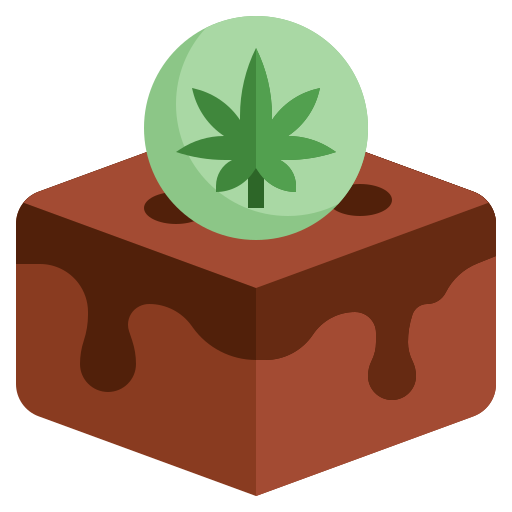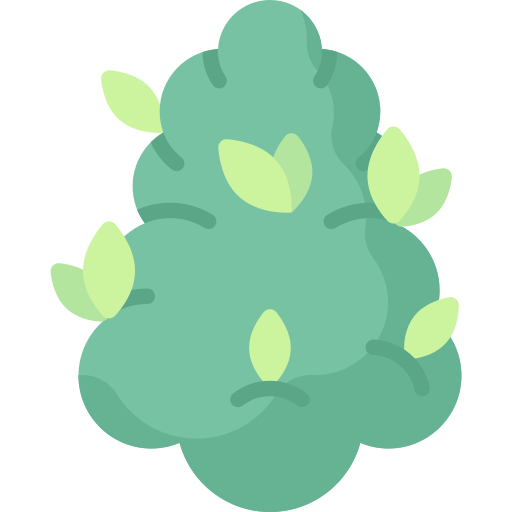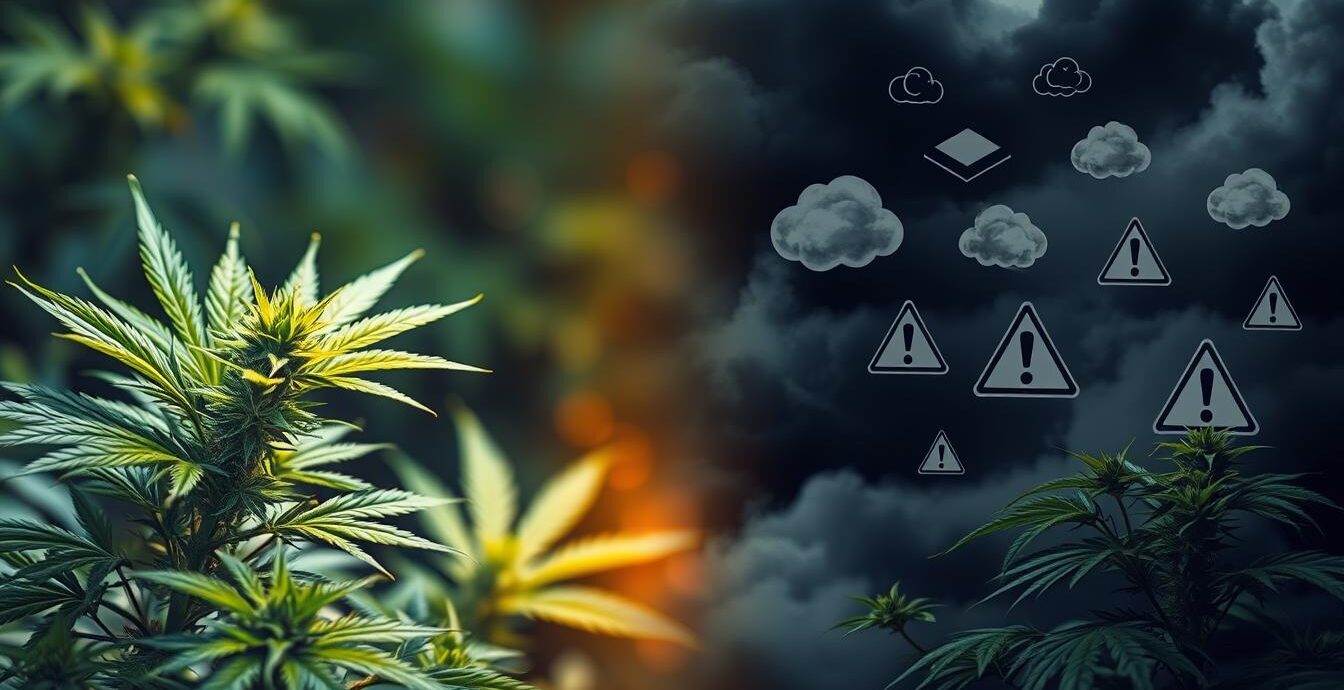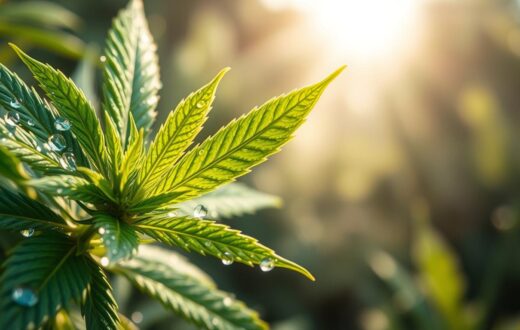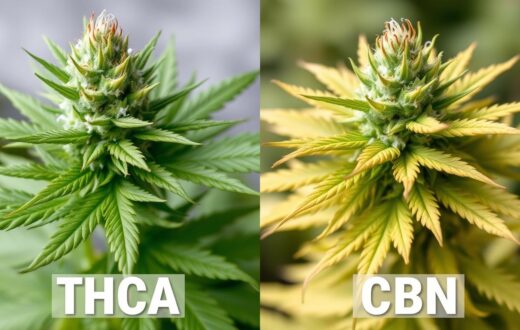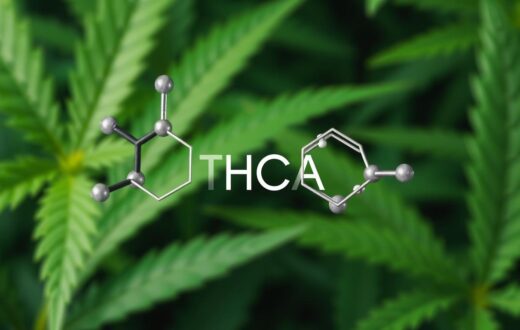The cannabis world is growing fast, and THCA is getting a lot of attention. But what is THCA, and how does it differ from THC? What are the good and bad sides of using this compound? Let’s find out.
THCA is found in raw cannabis plants and doesn’t make you high. It’s the early form of THC, the main part of marijuana that gets you feeling altered. Even though THCA and THC look similar, THCA can’t connect with our body’s cannabinoid receptors. This means it doesn’t cause the feeling of being high.
So, why is THCA important if it doesn’t get you high? It might help with pain, protect the brain, and stop nausea. But, because the cannabis market isn’t well-regulated, it’s key to know the difference between THCA and THC. This helps you make smart choices about your health.
What is THCA?
THCA, or tetrahydrocannabinolic acid, is found in raw cannabis plants. It’s the non-psychoactive form of THC. Unlike THC, THCA doesn’t make you feel high because it doesn’t work the same way in the body.
Definition and Chemical Structure
THCA has a special chemical structure. It has a carboxylic acid group (COOH) attached. This group is what makes THCA different from THC. When THCA is heated, light, or aged, it turns into THC.
How THCA Differs from THC
THCA and THC have different effects on the body. THC makes you feel intoxicated, but THCA doesn’t. THCA might help with inflammation, protect the brain, and stop nausea, all without the high feeling.
Potential Health Benefits of THCA
THCA is a precursor to THC and shows great promise. It may help with inflammation, protect the brain, and ease nausea. These benefits are seen in studies and could change how we treat health issues.
Anti-Inflammatory Properties
THCA is known for its anti-inflammatory effects. It might help with arthritis and inflammatory bowel disease. It can reduce swelling and inflammation in the body.
Neuroprotective Effects
Animal studies suggest THCA could protect the brain. It might help with Parkinson’s and Alzheimer’s. Its antioxidants could shield brain cells from damage.
Potential Anti-Nausea Benefits
THCA could also ease nausea and vomiting. This is good news for those going through chemotherapy or dealing with nausea from other conditions. It could offer relief to many people.
As research goes on, the thca therapeutic potential and thca medical uses look bright. It could be a key part of holistic and alternative healthcare in the future.
Risks Associated with THCA
THCA itself is not seen as dangerous. Yet, there are risks linked to its use. The main worry is the lack of long-term studies on THCA. Since it’s new, we don’t know its long-term effects well.
Possible Drug Interactions
THCA might interact with some medicines. This could lead to serious problems. If you’re on medication, talk to your doctor before using THCA. This ensures it’s safe and works well for you.
Conversion to THC
When THCA is heated, like when smoked or vaped, it turns into THC. This can cause unwanted effects, like feeling high. It’s key to know this happens and choose how you use THCA wisely.
The cannabis market’s lack of rules can also be a problem. This means products might not be the same every time. There could be bad stuff in them too, which is not safe.
Even though THCA is safer than THC, it’s still important to be careful. Learn about the risks and talk to doctors. Also, pick high-quality, regulated cannabis products to stay safe.
THCA and Pain Management
THCA might be a good choice for pain relief without THC’s psychoactive effects. It’s a non-psychoactive cannabinoid found in cannabis and hemp. It has strong anti-inflammatory properties, which could help manage different types of pain.
Pain Relief without Psychoactivity
Unlike THC, THCA doesn’t interact with brain receptors that cause the “high” feeling. This means it could offer pain relief without altering your mind. Some early studies and patient reports suggest it may reduce inflammation, muscle spasms, and discomfort.
Patient Testimonials and Case Studies
Though research on THCA for pain is still in its early stages, some users have seen positive results. They’ve used THCA-rich products for chronic pain, arthritis, and neuropathic pain. Studies and patient stories show THCA can reduce inflammation and relax without affecting your mind.
As the cannabis industry grows, more research is needed to understand THCA’s role in pain management. But, the current evidence and patient feedback suggest THCA could be a valuable option. It offers thca pain relief and thca medical uses without the psychoactive effects of traditional cannabis.
Legal Status of THCA in the United States
The legal status of THCA in the U.S. is complex. It’s legal under federal rules if the cannabis plant has less than 0.3% THC. This rule was set by the 2018 Farm Bill, which took hemp off the list of controlled substances.
Federal Regulations
The Farm Bill defines hemp as cannabis with 0.3% or less THC. This makes THCA legal nationwide. But, it also lets people make THC from hemp-derived THCA. This can cause problems in places where recreational marijuana is banned.
State Laws and Medical Use
Even though the feds say THCA is legal, state laws differ a lot. Some states have rules about THCA products, especially for medical use. It’s important for people to check their local laws before buying THCA products.
The legal status of THCA in the U.S. is changing. The risk of THCA being turned into THC makes the rules tricky. It’s key to keep up with thca federal regulations and state laws for those interested in its benefits.
How to Use THCA Safely
When using THCA, start with small doses and increase as needed. THCA is found in raw cannabis, edibles, and topical products like patches. It’s the non-psychoactive part of THC.
Recommended Dosage
Beginners should start with 2.5-5 mg of THCA. This small dose helps you see how you react and adjust. Everyone’s body is different, so it’s important to listen to your body and find the right dose.
Methods of Consumption
There are several ways to use THCA. Eating raw cannabis buds is one way to get the benefits of THCA. THCA-infused edibles, like gummies or tinctures, offer a longer-lasting effect. Topical products, like patches, provide a steady amount of THCA in your blood.
It’s important to buy THCA products from trusted sources. Look for products that are transparent about their ingredients and have third-party lab tests. This ensures you’re getting safe and quality products.
Comparing THCA to Other Cannabinoids
Exploring THCA’s benefits and uses requires knowing its differences from THC and CBD. THCA is the raw, unheated THC found in cannabis plants. THC, on the other hand, is the psychoactive part that causes the “high.” THCA is non-psychoactive, making it interesting for health and wellness.
THCA vs THC
THCA and THC have different structures and effects on our bodies. THCA has a carboxylic acid group that changes when cannabis is heated. This change from THCA to THC is what makes THC psychoactive, while THCA stays non-intoxicating.
THCA vs CBD
THCA and CBD are both non-psychoactive, but they work differently in our bodies. THCA is known for its anti-inflammatory and neuroprotective effects. CBD is famous for reducing pain and anxiety. The amount of these cannabinoids in cannabis also varies, with THCA found more in raw plants and CBD in products.
Knowing how THCA compares to other cannabinoids helps us understand its benefits. This knowledge aids in making smart choices about using cannabis and discovering THCA’s health uses.
Side Effects of THCA
THCA, found in fresh cannabis plants, is mostly safe. But, it can cause mild side effects in some people. Knowing these side effects and when to get medical help is key.
Common Mild Side Effects
Common side effects of THCA include nausea, upset stomach, itching, and skin rashes. Rarely, people might cough or wheeze. These effects usually don’t last long and can be managed with the right dosage.
When to Seek Medical Advice
If THCA side effects last or are severe, get medical advice. This is crucial if you’re taking it with other medicines. Your doctor can help ensure THCA is used safely, especially if you have health issues.
Decarboxylation of THCA can turn it into THC, leading to more side effects. These include dry mouth, bloodshot eyes, and changes in heart rate and thinking. Always follow the recommended dosage when using THCA products.
The Role of THCA in Medical Treatments
The cannabis industry is growing, and THCA (tetrahydrocannabinolic acid) is getting more attention. It’s not just THC (tetrahydrocannabinol) that’s important anymore. Research shows THCA could be key in many medical treatments.
Use in Cancer Therapy
THCA might help with nausea in cancer patients getting chemo. It could also slow down some cancer cells. But, we need more studies to know for sure.
Looking for safe and effective cancer treatments, THCA is a promising area to explore.
Potential Impact on Epilepsy Management
THCA might help with epilepsy too. CBD (cannabidiol) is already approved for some epilepsy types. But, THCA’s effects are still being studied.
Some people use raw cannabis juice with THCA to manage epilepsy. This shows we need more research on THCA’s benefits.
As scientists learn more about cannabis, THCA’s role in medicine is growing. It shows promise in cancer and epilepsy treatments. More research is needed to unlock its full potential.
Current Research Trends in THCA
Research on THCA (tetrahydrocannabinolic acid) is growing, even though it’s less known than THC. Scientists are looking into its benefits and uses. Studies and trials are uncovering its unique properties, opening doors to new discoveries.
Clinical Trials and Studies
Animal studies have shown THCA’s potential in fighting inflammation and protecting the brain. Researchers want to see if it can help with chronic pain, neurodegenerative diseases, and metabolic issues. They’re running clinical trials to confirm these findings and understand how THCA works in the body.
Future Directions for THCA Research
As scientists dive deeper into thca research studies and thca clinical trials, they’re focusing on the right dosage and how to use it safely. They also aim to understand how THCA interacts with our body’s endocannabinoid system. This could unlock its full healing potential. With more interest and funding, THCA research is set to make big strides in medicine.
THCA and the Endocannabinoid System
To grasp the benefits of THCA, we must look at how it works with the endocannabinoid system. Unlike THC, THCA doesn’t directly connect with CB1 and CB2 receptors. This makes THCA unique and could be why it’s good for health.
Interaction with Cannabinoid Receptors
Even though THCA doesn’t bind to CB1 and CB2 receptors like THC, it still affects the endocannabinoid system. Scientists are studying how THCA might work to reduce inflammation, protect the brain, and help with nausea. They think it could do this without causing the high feeling THC does.
Influence on Body Homeostasis
The endocannabinoid system is key to keeping our bodies in balance. THCA might help with this balance. Research shows it could manage inflammation, protect the brain, and help with metabolism. These are all important for staying healthy.
Learning more about THCA and the endocannabinoid system is crucial. As scientists delve deeper, we might find new ways to use THCA for health and wellness.
Personal Experiences with THCA
Many people have shared their stories about THCA, a non-intoxicating cannabinoid. They say it helps with pain, reduces inflammation, and eases nausea. These personal accounts are interesting and worth looking into.
Anecdotal Reports from Users
Some folks say THCA has improved their sleep and overall health. One person found it helped with chronic back pain, cutting down on pain meds. Another said it calmed their anxiety and stress.
But, it’s key to remember that everyone reacts differently to THCA. Things like dosage and how you take it can change how it affects you. thca user experiences are helpful, but we should also look at scientific studies.
The Importance of Individual Responses
It’s important to understand that thca anecdotal evidence might not apply to everyone. What works for one person might not work for another. It’s wise to start with small amounts and watch how your body reacts.
Sharing their stories, THCA users help us learn more about it. But, we should be careful and talk to doctors before trying it out.
Combining THCA with Other Treatments
As we learn more about THCA, doctors are looking into using it in treatment plans. They mix THCA with other cannabinoids, herbs, or traditional treatments. This mix can work better together.
Holistic Approaches to Wellness
Healthcare experts suggest a holistic approach when using THCA. This means making lifestyle changes, eating better, and managing stress. It’s about improving overall health, not just treating symptoms.
Integrating THCA into a Treatment Plan
Adding THCA to a treatment plan needs careful work with doctors, especially if you’re on other meds. They must think about dosage, timing, and how treatments might interact. This is an exciting area of study in medicine.
Using thca holistic treatment and thca integrative medicine can help people get the most out of THCA. It’s a way to improve health in a more personal and complete way.
Consumer Products Containing THCA
THCA, a non-psychoactive part of THC, is getting popular in cannabis products. It’s found in everything from raw cannabis to tinctures, topicals, and edibles. THCA crystals, or “diamonds,” are especially sought after for their strong and possibly healing effects.
Types of Available Products
There are many THCA products out there, each suited to different tastes and ways of using them. For example, the Area 52 THCA Disposable Vape Pen has 400 mg of THCA, 1100 mg of HHC, and 280 mg of CBD. Finest Labs and Koi CBD also make THCA vape pens.
For those who like to smoke, THCA pre-rolls are a good choice. Mystic Labs offers THCA pre-rolls with 1.25 grams of hemp flower. Edible THCA products, like Cookies THCA Pre-Rolls, are another option. They have 1000 mg of hemp extract per 1-gram pre-roll.
There are also topicals like creams and lotions. They might help with pain and inflammation in specific areas.
Quality and Sourcing Considerations
Choosing the right THCA product means looking at quality and where it comes from. Good brands should show lab test results to prove what they say about THCA. Some products, like Binoid THCA Disposable Vapes, might not tell you how much THCA they have. So, be careful.
It’s also key to know that THCA can turn into THC when heated. This could make you feel psychoactive effects or fail a drug test.
With so many THCA products out there, you have lots of choices to try its benefits. But, always do your homework on quality and where it comes from. And talk to a doctor before adding THCA to your health routine.
Final Thoughts on THCA Benefits vs Risks
Thinking about using THCA means looking at both its good points and possible downsides. THCA might help with pain, reduce inflammation, and protect the brain. But, there’s not much long-term research, it could interact with other drugs, and it might turn into THC.
Weighing the Pros and Cons
Deciding on THCA involves knowing your health needs and talking to doctors. The cannabis world is always changing, so you need to keep learning. It’s key to think about the good and bad of THCA to see if it fits your health goals and legal rules.
Making Informed Choices
Choosing to use THCA should be a well-thought-out decision. Look for solid info from trusted sources and talk to your doctor. As research grows, our understanding of THCA might change too. So, it’s vital to stay updated and open to new information.

